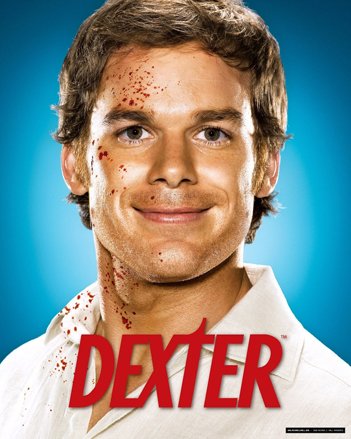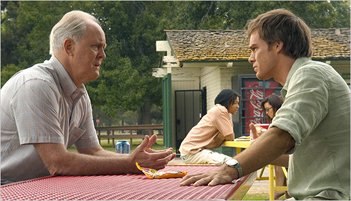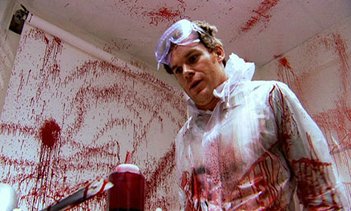Dexter’s Demise: The Utter Collapse Of A Once Great Show
**Contains spoilers for all seasons**
What’s the saddest thing that can happen to a TV show?
Maybe it’s the death of a beloved character, or the cancellation of the show before its time? I don’t think so, I posit that these things are nothing in comparison to what I’m going to talk about.
I am going to talk about death, let’s make that clear from the off. But it’s a different kind of death, one that’s slow and painful to watch. I’m talking about the demise of a once great show. The kind you love so much that you stick with it although you know the quality is slowly, but quite visibly, going downhill with every passing episode. But you’ve invested so much in it now and you don’t want to let it go, you feel that it will get better, that it will pull through. Maybe just one more episode. Perhaps it was the director and the next one will be fine. It has to be, it has to be…
Then one day you realise that you just don’t care anymore. All the love you once had for the show as been squeezed out of you as you watch episode after episode of complete and utter dross that only bares a passing resemblance to that which you once loved. It may go under the same name but it’s an imposter, a faded facsimile, a pointless husk…
I’m sure we’ve all suffered this, no show is perfect after all, but I want to share with you my personal experience.
My friends – we need to talk about Dexter.

Oh, Dexter. What happened? Your first four series were So. Damn. Good. Okay, so your season one story line was given to you on a plate from Jeff Lindsay’s excellent novel so you had a free pass there but everything was so well executed. Michael C Hall became Dexter, C.S. Lee took to Vince Masuka with relish and Erik King made himself one of the series most memorable characters as Sergeant Doakes despite (SPOILERS start here) carking it in the second series.
A quick re-cap for those unaware, the Dexter of the title is a serial killer who also happens to be a blood spatter analyst who works for the F.B.I. His adopted father realised that Dexter wasn’t quite right as a child and instead of weaning of his murdery habits decided instead to make him a vigilante who could still kill, but just – y’know – the bad guys. It would flit between disturbing and darkly humorous – in fact when the FX channel first trailed it in the UK it was misleadingly framed as a dark comedy – and it didn’t rely on gross out moments to make it interesting despite being the story of a lot of people getting chopped up.
Then, after the first season’s parade of corpses, season two saw Dexter pare down his killing as Doakes decided to follow him everywhere he went. A psychotic love interest was brought in who influenced Dexter’s killing and it was she who killed Sergeant Doakes in an attempt to stop Dexter being arrested. This was a shocking turn of events as many, including myself, would argue that Doakes was the only real threat to Dexter’s way of life and therefore the main source of friction in the series. As such it could be seen as the series’ first mistake.
The third season saw the arrival of Jimmy Smits as Miguel Prado, an Assistant District Attorney who made friends with Dexter and found out about his serial killing habit. Keen to get rid of the people he can’t put away Prado encourages Dexter to show him what to do and it’s not long before Prado gets out of control. Smits elevates the programme to another level, his slow descent into a wide-eyed psycho is as uncomfortable as it is exciting and at this point it was difficult to see where the programme would go. But nobody adjusted his or her expectations to allow for the Lithgow factor.

Everybody knows John Lithgow is a fantastic actor and can play ‘bad’ in his sleep but something about his character in Dexter really brought out the best in him. Every episode was TV gold and the series also included one of the best twists on TV in years. This should have been a warning. Programmes rarely reach these heights then maintain that level of quality for the rest of its run.
And so it was the writers were unsure what to do with Dexter. They had killed off his wife and Dexter was supposed to be unemotional so what the writers decided would be a good idea was to completely change this trait within one episode. By the end of the first episode of the fifth series Dexter had completely unraveled, something that should’ve built subtly on the character but instead only managed to undermine everything he was about. They then added to this by giving him another love interest of sorts in the shape of Lumen Pierce (Julia Stiles), an archetypal victim character who Dexter takes under his wing, and an overly complex plot that suffers from the Spiderman 3 disease, i.e. too much story, too many new characters, not enough time. Hence season 5 just became a mess despite strong performances from all involved. It was with this series that the cracks first began to show and maybe they should have wrapped up Dexter there as they were obviously starting to run out of ideas but then things nearly turned around.
Series 6 streamlined the story-line again, focusing on one big bad – the Doomsday Killer – fantastically portrayed by Colin Hanks and Edward James Olmos. The sub-plots only added to the story in good ways instead of draining away from the momentum as they had begun to in season five. However looking back it’s clear that the series is not as good as it first appeared. The killings were too bloody, too gauche, which when put in context with the programme, as a whole, smacks of desperation. The story and the performances carried this series to make it look like Dexter might have had life in him yet.
Then, oh dear, series 7.
At the end of the sixth series Dexter’s sister Debra catches him burying a knife deep into the doomsday killer’s heart. From the moment viewers saw this they knew things could only go two ways.
1) Things would get brilliant again as they explore the huge and messy fallout this would cause.
2) It would turn out the knife in the Doomsday Killer’s heart actually was a metaphor for the writers plunging a knife deep into the heart of the programme and things were about to get very bad indeed.
It was the second one.
Dexter the TV programme had run its course the only problem being it still insisted on carrying on like a zombie in denial, refusing to believe that the fact that their skin was slowly rotting off was a sign that they may actually be dead. They could’ve wrapped it up quite easily, all they had to do was have a tearful Deb arrest her brother because that would have made sense, or just end it with the death of the Doomsday killer and no attempt to make have any sense of justice for Dexter’s crimes woven into the programme. It’s not as if the series ever made any real sense, it was just good entertainment God dammit. I don’t think it would’ve been a bad thing if they had just been cancelled after series six. There was enough goodwill left in the audience that there would have been uproar but it would have been remembered fondly.

What happened however was unforgivable. We saw Dexter twist Debra’s morals, which had previously been set in stone and one of the constants of Dexter. He was the morally ambiguous one, she the one that would follow the rules no matter what. It was another mistake from the writers that undermined one of the basic premises of the programme but even worse the story was just so piss poor. It focused too much on what was going on around Dexter and didn’t utilise the strongest tool they had at their disposal – Dexter himself. Obviously programmes have to grow and expand but the writers had expanded on the wrong part. In doing so they annoyed the audience to such a degree that they didn’t care about any of the characters any more.
If I’m being honest I never made it all the way through the series, and didn’t even begin series 8. I mean why would I? The programme was ruined.
I did hear how it ended, and in much the same way that if I heard about an old friend who unforgivably betrayed me and over whom I now hold a bitter grudge, is now living in a council flat in the rough part of town with only pile after pile of damp newspapers for company. I couldn’t care less.
He was dead to me years ago.
Featured Image via tn2magazine.ie

